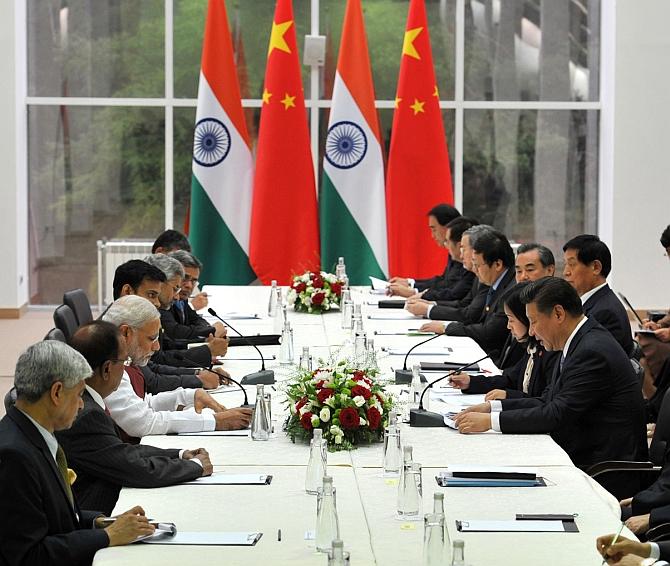Prime Minister Narendra Modi has "strongly" and "clearly" conveyed concerns to Chinese President Xi Jinping over Beijing blocking a proposal for action by the United Nations against Pakistan on the release of jailed Mumbai attack mastermind Zaki-ur-Rehman Lakhvi, with India rejecting the "weak evidence" theory propounded by Beijing in this regard.

The two sides felt that the issue should be discussed further at the level of officials.
Modi also voiced India's concerns over the $46 billion economic corridor that China is building with Pakistan as it crosses Pakistan-occupied Kashmir, which India considers its part.
"Prime Minister Narendra Modi strongly took up the issue (of China blocking the resolution). He conveyed India's concerns," Foreign Secretary S Jaishankar said while briefing media persons on the 90-minute Modi-Xi meeting, the fifth between the two leaders in the last one year.
Underlining that the issue was discussed in "some detail," he said, "the prime minister expressed our view, how people see it in India."
Elaborating, Jaishankar said, "The prime minister made our concerns known very clearly."
Asked about the response, "I can assume that the Chinese side was impressed with the clarity and directness in which it was conveyed."
Indicating that the issue will now be discussed at the level of officials, the foreign secretary said, "It was felt that we should keep talking on this."
Asked what would be the format of the discussions on this issue, he said officials will take up from where the leaders have left.
"There is no particular mechanism. The MEA can discuss with the Embassy(Chinese). There are a range of mechanisms," he added.
At a meeting of the UN Sanctions Committee last month, India had sought action against Pakistan for release of LeT operations commander Lakhvi in the 26/11 trial in violation of a UN resolution but the Chinese representatives blocked the move on grounds that New Delhi did not provide sufficient information.
Rejecting the theory about "weak evidence" presented by China, Jaishankar said, "It is not an issue of evidence... The whole world knows what the role of Lakhvi (in 26/11
attacks) was. If our evidence were weak, then why did all others (in the UN) accept it?"
Modi and Xi also had detailed discussions on the border issue, including ways to maintain peace and tranquillity there and have confidence building measures like more meeting points, the foreign secretary said.
Noting that National Security Advisers of the two countries were also present in the meeting, he said the two sides discussed ways to take the talks forward.
"The overall sense of the meeting was that there is new energy and new enthusiasm in the relationship," he said.
Jaishankar said the two leaders recalled their last two meetings -- one during Xi's India visit and Modi's China visit -- and memories regarding those.
In this context, they reviewed the progress made since Modi's China visit in May on the decision regarding China's participation in industrial parks in India, Jaishankar said.
The two leaders took a positive note of the progress on this, he said, adding the outlook for investment in this is "positive."
The prime minister made a mention about Yoga Day celebrations on June 21 and appreciated the fact that many cities in China participated in it.
To questions about BRICS bank and whether it is a competitor to recently-established Asian Infrastructure and Investment Bank, Jaishankar said the two have different roles and are not overlapping.
He underlined that development is a huge issue and resources for should not necessarily be channelised from only one source but multiple sources.
"There is large enough space for multiple institutions," the foreign secretary added.
Image: Prime Minister Narendra Modi holding a delegation-level meeting with Chinese President Xi Jinping in Ufa, Russia. Photograph: Press Information Bureau










